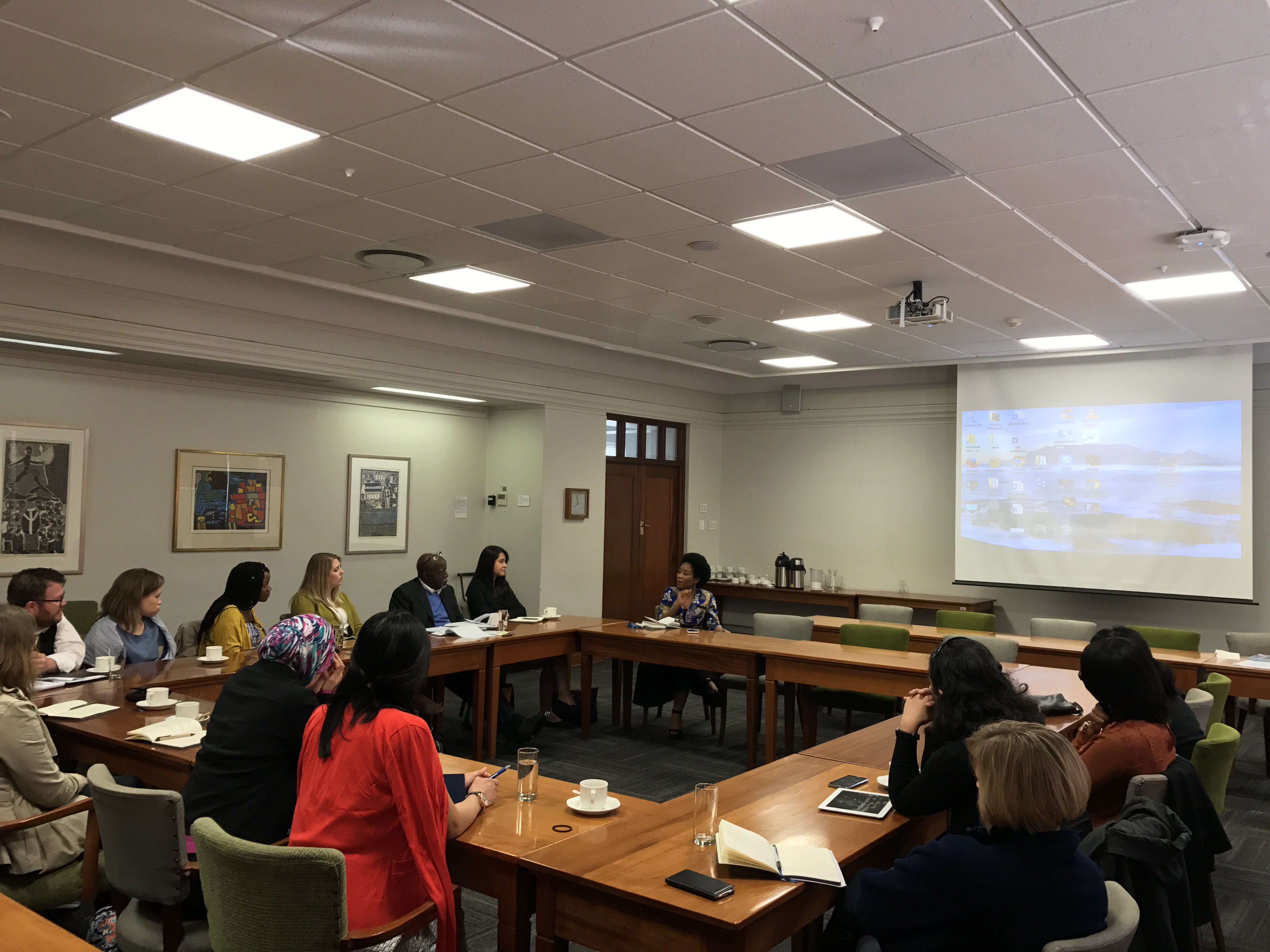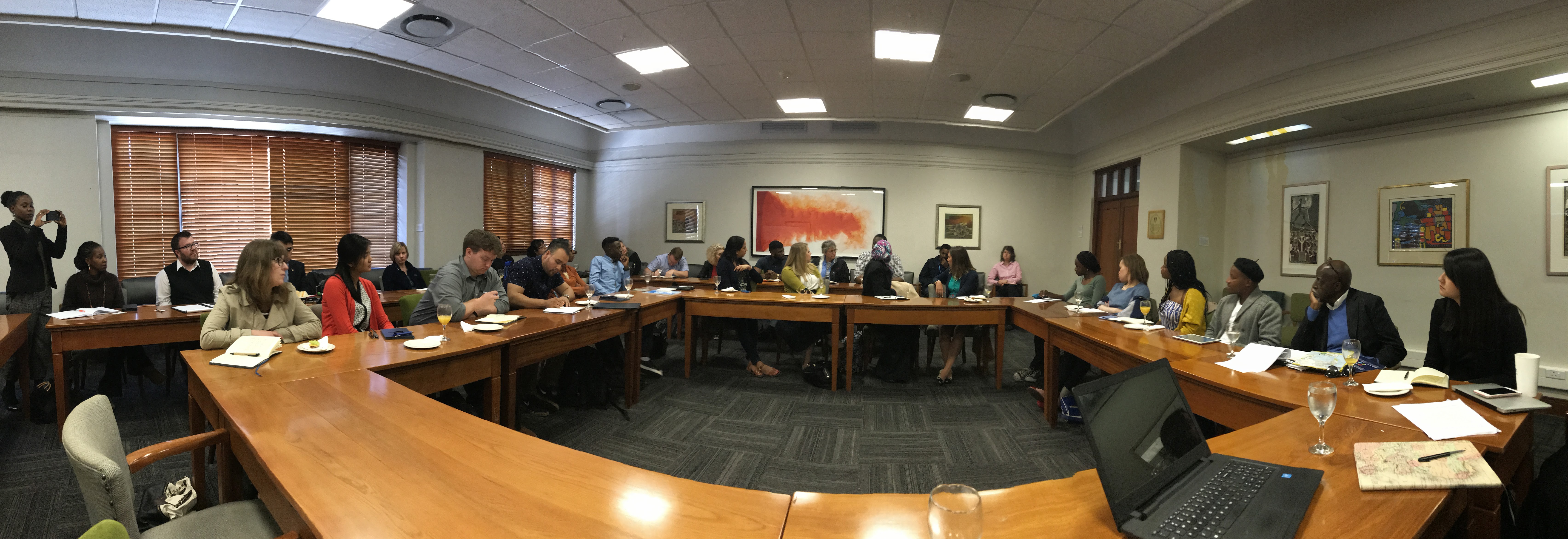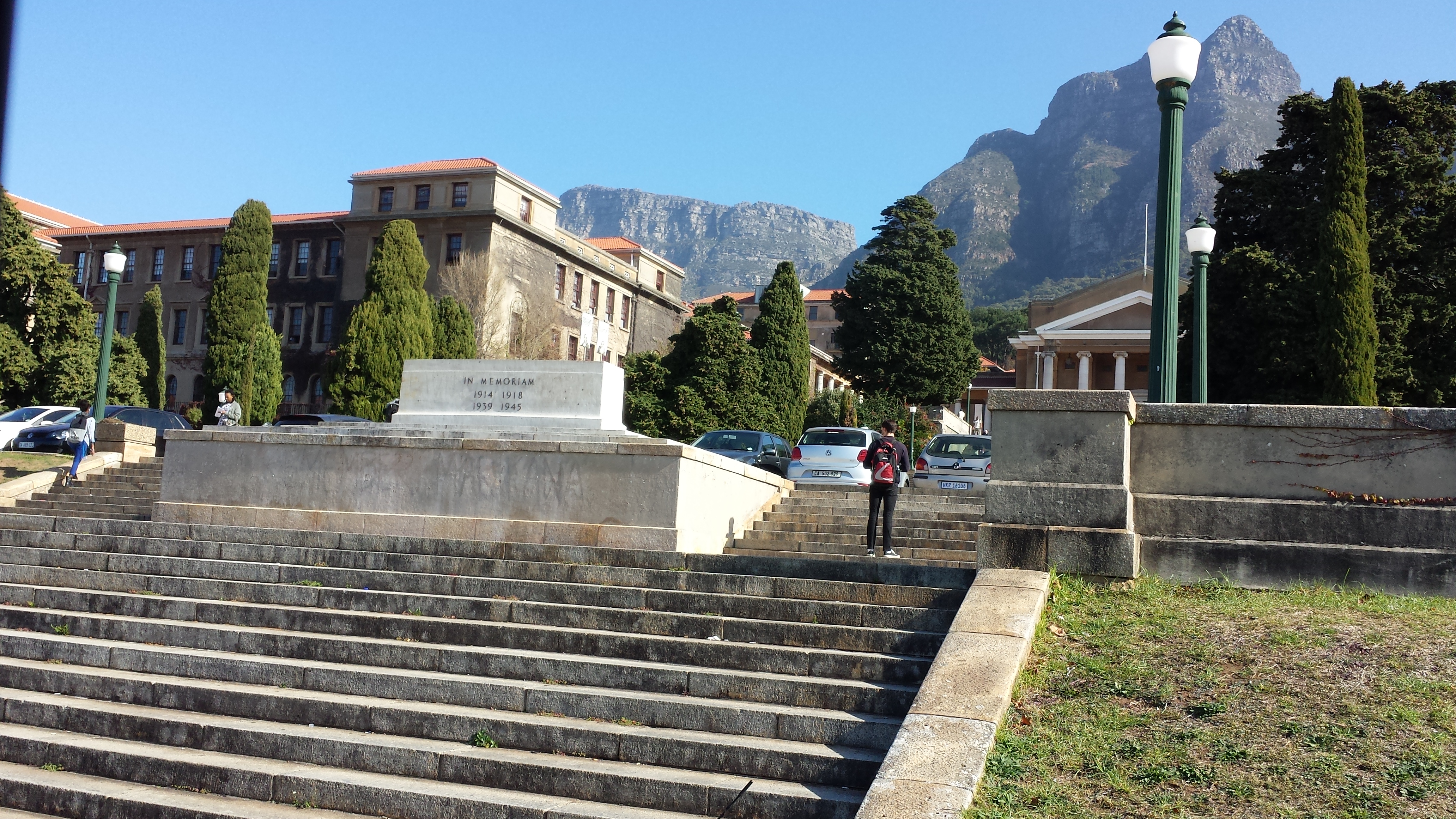University of Cape Town
At the University of Cape Town (UCT), we have the privilege of meeting with a variety of colleagues. Our host is Dr. Mamokgethi Phakeng, deputy vice chancellor of research and internationalization. Besides being an incredibly accomplished scholar, the only black female South African professor at UCT, and a caring university administrator, today she also serves as our conscientious time keeper and moderator.

We first hear from Dr. David Cooper, UCT emeritus professor of sociology, who is the coauthor of the highly regarded “Skewed Revolution” and who has recently analyzed new data to discover the disturbing trend of decreasing enrollments by black South Africans, particularly from lower socioeconomic circumstances.

Dr. Phakeng has also afforded us the opportunity to hear directly from #Rhodesmustfall student leaders about their concerns and criticisms of the institution. Once again the concept of decolonizing the curriculum is expressed. As one student describes it, “There is not a university for Africa, only universities in Africa.”

Similar to their peers we have heard from elsewhere, these UCT students are talented, promising young scholars, trying to navigate their way through college life and all the competing priorities, concerns, and emotions which come with that experience. They have also assumed the mantle of responsibility for a cause in which they are both passionate and dedicated. And, they are inspiring.
Conversation with UCT Deputy Vice Chancellor Mamokgethi Phakeng
The University of Cape Town (UCT) was mentioned quite a bit leading up to our visit. UCT is the ‘most prestigious’ university in South Africa with an international reputation for research and teaching. Similar to the U.S.’s Harvard University, UCT was originally dedicated to the education of White men. While UCT now admits low-income students and Black students, often these students are at the margins with both representation and campus engagement.

We started the morning with a conversation with Professor Mamokgethi Phakeng. Dr. Phakeng currently serves as the Deputy Vice Chancellor for Research and Internationalisation and Full Professor of Mathematics Education, a role she has had only for five months. Prior to her role at UCT she held similar roles at The University of South Africa. She has many accomplishments including being the first Black woman in South Africa to receive a Ph.D. in Mathematics Education, being named the CEO Magazine award for most influential woman in education and training (2013 & 2014), and founding the nonprofit, Adopt-a-Learner, that provides educational and financial resources to students in townships to acquire higher education credentials. Her charismatic demeanor, along with her passion and experience in higher education transformation helped frame the remainder of our time at UCT.
Dr. Phakeng highlighted the unique role UCT has in creating a research infrastructure in South Africa and leading efforts for racial transformation. Being able to attract the ‘crème de la crème’ of students allows UCT to function at the highest level of academic rigor. Dr. Phakeng, along with her colleagues, mentioned the unique and gifted students UCT attracts. For example, the #RhodesMustFall movement started at UCT. This movement was the precursor to the national #FeesMustFall student movement that swept the country from 2015 – 2016.
Dr. Phakeng spoke honestly about her connection to student activists, her own experiences as a Black woman in South African higher education, and the need for continued/enhanced progress towards transformation. She helped frame issues South African higher education was facing in regards to being compared to Western universities in order to obtain legitimacy along with increasing pressure to create a university experience that teaches, promotes, and researches from an indigenous knowledge perspective. This paradigmatically contradictory dilemma was best exemplified by a specific quote from Dr. Phakeng. When speaking of how she was grappling with the role of UCT in South African higher education, she said, “We are the best university IN Africa, but are we the best university FOR Africa?”
She is one of the rare higher education administrators that seemed to understand the need for relationship-building, systemic evolution, student activism, and academic debate. She challenged the group to be careful with the stories that are shared by South Africans, so I hope I have done our brief time with DVC Phakeng justice.
–Jeff Grim, doctoral student
**************************************************************
Conversation with UCT student movement leaders
“Here in South Africa, the ruling class is white…If you are white you are rich, if you are rich you are white…if you are poor you are black, if you are black you are poor.” Those were the powerful and direct words of one of the students at the University of Cape Town (UCT). Obviously, in my United States context, things aren’t so black and white (no pun intended). I’ve met plenty of poor white people and a few rich black people. Yet still, the words of this student — like the words of so many other students we encountered on our trip to South Africa — resonated with me on a deep level.
In the era of Trayvon, Mike, Sandra, Rekiya, Tamir, Walter, Philando…(the list goes on), the reality of a white ruling class is pervasive and what makes sense to me. Framing that in the context of higher education, our conversation with the students at UCT interrogated one major question: What does it mean to be successful? The overwhelming response was this: in modern-day society, to be successful is to assimilate. As students spoke to us about their efforts to decolonize curriculum, I couldn’t help but relate their experiences to my own being in classrooms where the only mention of black people was either “slaves” or “Martin Luther King, Jr.”
The experience, however, was slightly more jarring for me because for the first time in my life, I’d found myself walking on non-HBCU college campuses where a majority of the students were black. No way they would deal with issues of misrepresentation, stereotyping, access, and forced assimilation, in the same ways students at PWI’s do, right? Wrong. What I heard from the Black African students at UCT was the way-too-familiar narrative of an ongoing struggle with loss of identity as a result of the institution — and society — forcing their assimilation into European standards of education and success. In other words:
“When I go back to my people, I’ve lost my blackness, and when I come back [to school] I’m too black for my institution.”
So I asked and am still asking, how do we — black people — legitimize our voices, experiences and knowledge and still achieve ‘success’ in a society which already has a predetermined standard for success?
A lively conversation about redefining success, following one’s dreams and becoming entrepreneurs lead me the following conclusion: decolonization can not and will not happen within the system, especially because the system was built on colonization. While I am not sure what that process looks like, my trip to South Africa helped clarify what my role in the process is. In thinking of my future role(s) as a higher education professional, I have been motivated by this trip to work to empower students. Specifically to empower black students to redefine the system, be entrepreneurial and establish both new meanings of success and alternative forms of knowledge. I look forward to working alongside professionals committed to doing the same.
–Melissa Charles (MA ’16)
